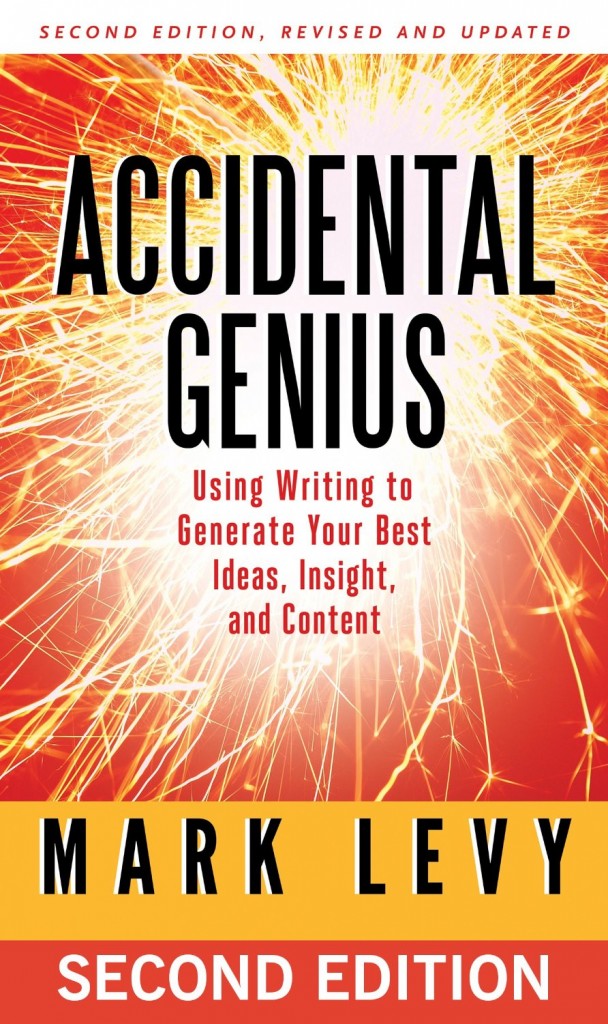Have you ever been taking a shower and the solution to some problem you’ve been thinking about for days suddenly comes to you? It has to me… on almost a daily basis. I find this frustrating for two reasons. First, because I don’t have writing utensils in the shower. And second, because it means that solutions to challenges I’m facing are already in my mind somewhere. If I could just get them out on my own timetable.
Accidental Genius by Mark Levy is a book about one particularly useful method to ferret ideas out of your own mind.
I was drawn to Levy’s book because it promised to improve that very skill. It suggests a way to sit and find interesting insights of your own with some level of predictability. I love that idea. I’m reading much faster than I can write these days, and discovering–or remembering–my own insights is a problem sometimes.
In the Book
Freewriting is one of those things that doesn’t have any real rules. There’s no wrong way to do it, per se. But there are some fundamental things that are always true. Namely that you do not censor what you’re writing. Good ideas, bad ideas, nonsense, poor grammar, lack of grammar altogether. You write whatever comes to mind. That, however, is a challenge because of our “internal editor,” as Levy called it. Our editor keeps us from saying or writing things we believe will be deemed unacceptable. “What might others think if they read this?” That’s a useful question at some point in the writing process. During the process of free writing, however, doing that will keep us from exploring unique ideas, since it’s only common ideas we can easily judge.
Levy would add that we must write quickly and I liked his reason why. To explain, let me back up. Several years ago I read a book by Abby Marks-Beale called 10 Days to Faster Reading. (It worked, by the way, and I read like a maniac now) In it, Marks-Beale basically says that part of the reason we daydream and lose track of what we’re reading is because we’re reading too slowly. Our brains can perceive a lot of information at once, but for most of us, we haven’t revisited reading skills since we first learned to do it. At the time, it was one word, then the next, then the next, then the next. As adults when many people think of reading well, they think of looking carefully at each word. If your brain can take in a whole sentence at once, it’d make sense that you’re getting bored checking out each word.
In Accidental Genius, Levy theorizes something very similar. In effect, he says that our imagination works way faster than our editor and when we let our editor operate, our imagination gets bored. Writing quickly, he says, is a method for silencing your editor. By writing faster than your editor can edit, he’ll eventually just shut up. Since I began implementing some free writing habits into my workflow, I have found this to be true in a limited sense. My editor, however, is a raging control freak, so it’s been a challenge.
The book is structured in such a way so that he hopes the information will be useful to more than just writers. The first section of the book is an introduction to the concept of free writing. The mindset, the habits, the expectations. The second section he goes through some practical free writing exercises, such as having conversations on paper, making massive lists, lying to yourself, writing marathons and prompts, among others.
There were a lot of interesting suggestions in there, my favorite, however, was lying. The concept goes that before you begin free writing, you fix your mind on an idea, either reality or something made up. Then you take one feature, lie about it, and start free writing from there. So, for example, say my idea was “I should put on my coat before I walk the dog.” Lying about the idea might turn it into “I should put on my coat before I walk the elephant.” Or, “I should put a coat on the dog before I take him for a walk.” Or “I should shave the coat off before we go for a swim.” You get the idea. That might not seem very practical, but in problem solving it makes sense. We often revisit the same bad idea from different angles over and over, but if we refused to accept the reality of one little thing, our brain would have to start all over and come up with whole new ideas.
I found the technique Levy calls “Holding A Conversation on Paper” interesting as well. This is one I already do. When holding a paper conversation, the idea is to personify some other part of your mind in whatever way seems useful to you. You use that part of your mind to hold a conversation with yourself and deliver question prompts. Levy, for example, once imagined he was having a conversation with Abraham Lincoln. It didn’t matter that he had no idea how Abraham Lincoln would have acted, using the Lincoln character, Levy was able to draw out relevant responses from himself. Although I’ve never sat down with Lincoln, I can attest that the paper conversation is an effective way of drawing out my own responses.
The last section of the book is geared toward people who may have reason to refine their free written text into something published or shared. Although Levy is trying to keep the information useful to everyone, it’s mostly for the writers in the audience.
The Personal Experience
Since reading the book, I have introduced free writing exercises into my own daily workflow, and I am finding it an effective practice, at least for me. I’ll give you an idea of how I have been using free writing exercises day to day:
– In the morning, immediately after getting out of bed, I set a timer for 10 minutes, look away from the keyboard and write rapidly about whatever comes to mind. I leave behind a lot of typos and few truly coherent thoughts. When the timer goes off, I look back through what I wrote and try to identify themes that are likely to weigh on my day. I also give my editor a little fix by hitting spell check.
– After reading a few chapters of a book, I will set the timer for 10 minutes for each chapter I read. Then, much like in the morning, I will look away from the keyboard and type as quickly as I can. When I find myself getting off topic, I will pause for a moment, look through my highlights in the book, and use them as a writing prompt to get me going again.
– When I’m not sure the best way to respond to a situation, I will set my timer for 20 minutes and free write. In these cases, I have been using the paper conversation and the “lying” technique to get at useful conclusions.
In Conclusion
This was a book so full of practical advice, and with a learning curve I have already mostly crossed, that I really enjoyed it. The techniques have proven to be useful and have already produced some surprising ideas. While the book is written well, the learning curve associated with writing quickly, and for extended periods of time, is a steep one. I just don’t think it’s all that realistic for someone to whom writing is not a significant part of their life.


Recent Discussion